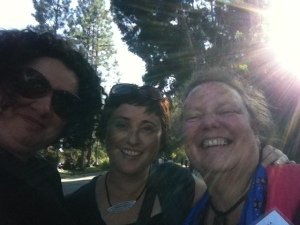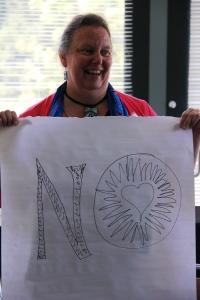Excerpt from: Faulkhead, S. & Thorpe, K. (2016). Dedication: Archives and Indigenous Communities, A. J., McKemmish, S. & Lau, A.(eds), Research in the Archival Multiverse, Monash University Press.
Allison B. Krebs (1956–2013) was a member of the Sault Ste. Marie Tribe of Chippewa Indians, a Ph.D. student at the Information School at the University of Washington, and member of the Indigenous Information Research Group at the University of Washington, Chair of the Native American Archives Roundtable of the Society of American Archivists, and served on the Steering and Strategic Planning Committees of the Association of Tribal Archives, Libraries and Museums (ATALM). Allison was a visiting scholar at Monash University in Australia, a Documenting Endangered Languages Fellow of the National Science Foundation, and earned an MLS as a Knowledge River Scholar at the University of Arizona. She also graduated in the first class of women from Yale College. Her research centered on Indigenous knowledge ecology.
Every time an old man dies in Africa, it is as if a library has burnt down (En Afrique, quand un vieillard meurt, c’est une bibliothèque qui brûle).
A library was burnt down. On the 26 January 2013, we lost our dear friend, colleague and sister Ally.
The incongruity of Ally leaving this world on Australia Day is not lost to us. This is a day of controversy and contradictions within Australia. On 26 January 1788, the first fleet from Great Britain arriving on the shores of the Eora people at Sydney Cove heralded Australia as a colony of Great Britain. This beginning of Australia was also the beginning of the dislocation, massacres, policing, and decimation of the Indigenous peoples of Australia. The 1888 centenary Australia Day celebrations saw Indigenous leaders protest by boycotting the celebrations, the 1938 Australia Day was declared a Day of Mourning, and by the 1988 bicentenary, Australia Day was widely seen as Invasion Day with protests across Australia. Then 1992 saw Survival Day concerts become a part of Australia Day celebrations to celebrate our Ancestors and peoples’ achievements and survival. For many, therefore, 26 January is a day of mixed emotions – sadness and pride, pain and joy, confusion and clarity, mourning and celebration.
The news of Ally’s passing became tangled in with the emotions already being felt by us as Indigenous Australians. Whilst much of Australia did not know Ally, we did and the sadness and pain we felt can never be expressed.


1) This biography is how Ally described herself. Ally Krebs, “Native America’s Twenty first-century Right to Know,” Archival Science, 12 no.2 (June 2012): 186.
2) A. Hampâté Bâ, “Amadou Hampâté Bâ,” African Studies Centre, http://www.ascleiden. nl/?q=content/webdossiers/amadou-hamp%C3%A2t%C3%A9–b%C3%A2]
Further reading on Ally’s contribution to the field of archives can be read here:
O’Neal, J., & Lewis, D. G. (2015). Native American Archives Special Issue: Dedication. Journal of Western Archives, 6(1), 1.
Author – Shannon Faulkhead
